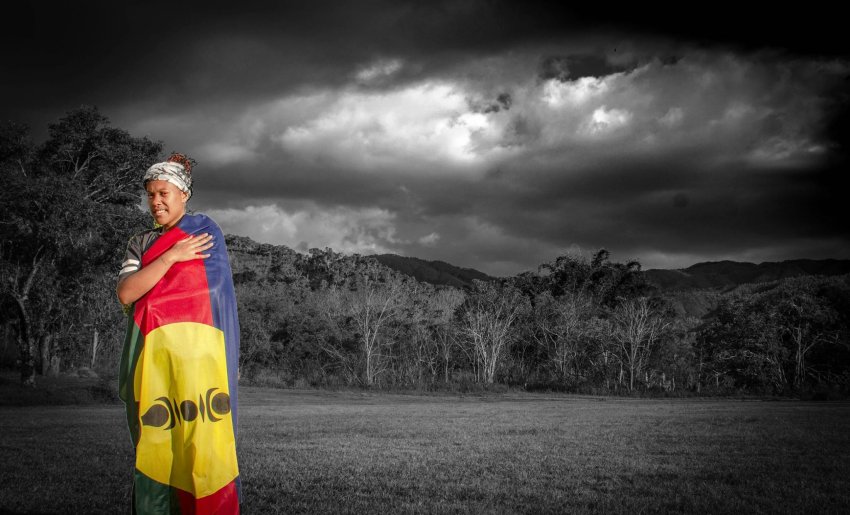
The struggle for self determination in New Caledonia (Kanaky) was boosted last November, when more than 43% of the population voted to support independence from France in a referendum. A second independence referendum will be held next year.
The FLNKS (The Kanak and Socialist National Liberation Front), a pro-independence alliance of political parties met in March to plan for the general elections in May and to prepare for the 2020 referendum. Green Left Weekly’s Susan Price spoke with FLNKS representative in Australia, Charles Wea about the congress and the referendum campaign.
***
What is the significance of the stronger than expected vote in favour of independence in November?
The result of the referendum last November was, for the Kanak people, a significant step towards the next referendum in November 2020.
Although there were three polls showing that only 30% would vote “Yes”, the result shows that the majority of the Kanak people still want independence and will never stop asserting the legitimacy of their claim, which is unavoidable and non-negotiable.
The referendum results not only legitimised the struggle towards self-determination internationally, but also give the Kanak people more encouragement and force to prepare for the next referendum next year.
Politically and socially, New Caledonian society is still divided into two camps in relation to the issue of independence, and this result could be interpreted as one of “colonial migration” against independence, as Kanak people voted “yes”.
Psychologically, the results gave hope and encouragement to Kanak youth and independence activists, however, it was a disappointment for the pro-French, even though they won the referendum by 57%.
What are the next steps for the pro-independence forces?
The next steps for the FLNKS are to prepare for the referendum next year.
Last month, the FLNKS organised its annual congress to prepare for the coming general elections in May and to reinforce its strategy for the second referendum. In addition, the FLNKS will continue dialogue with the French government in pursuit of the implementation of the Nouméa Accord.
[Explanatory note: The Nouméa Accord was signed in May 1998 by the French government, the FLNKS and the anti-independence RPCR (Rassamblement Pour la Calédonie dans la République), as part of a negotiated transition to independence. Key elements of the agreement included: shared sovereignty and an end to New Caledonia's status as a French overseas territory; elections for new political institutions; transfer of administrative powers; recognition of Kanak culture and identity; and a further transition before a referendum on self-determination.]
At the same time [we will be] maintaining dialogue with all communities living in New Caledonia on the alternative proposed by the FLNKS to build a new independent and multicultural nation — the only constructive perspective.
The next referendum is fundamental and important, and the objective now is to work with the Kanak youth, as they were very dynamic [during the last referendum] and particularly to convince all communities on the viability of building a multicultural nation outside the French constitution.
Provincial and Congressional elections are scheduled for May. What issues will left and pro-independence forces be campaigning on?
The coming elections in May will be a major test for the FLNKS in preparing for next year’s referendum. The majority of New Caledonia’s Congress [equivalent to its parliament] and the government are both under the control of anti-independence groups.
These coming elections will be a chance for us to take the majority in both institutions in order to enact major social and economic reforms and to prepare the country for a better transition to independence.
A general strike was held in March in the capital, Nouméa, against proposed changes to the retirement age. Can you tell us more about that?
The strike in Noumea was organised by some trade unions to express their opposition to a draft law to move the retirement age from 60 to 62 years.
Some trade unions are in favour and some are against, arguing that 60 years will give workers a better chance to enjoy their retirement for the rest of their life, as they have been working hard and longer.
In terms of economics, I think there is a need to make an evaluation of its impact and implications in order to propose a good date suitable for everybody.
Beyond this demonstration against the draft law on retirement, it is important to note that the “strike” in New Caledonia has become part of its culture, a normal process, and people are used to it.
But more deeply, New Caledonian society is very fragile because there are many social and economic inequalities, particularly between the French community and ocean communities including the Kanak people, Wallisians and Pacific communities.
Most of the strikes in Noumea essentially come from the fact that French elites are still continuing to impose a colonial system that does not match the aspirations of the people.
The consolidation of colonialism in New Caledonia continues to develop social inequalities, which most trade unions oppose.
The FLNKS proposes an independent nation with a new constitution and system where all communities have the same level of consideration and can benefit from a better distribution of wealth, which is not the case now.
The FLNKS is struggling to propose social and economic reforms in order to achieve a better future for the country, but it is difficult to do when you do not have the majority in the Congress. We hope our time will come this election.